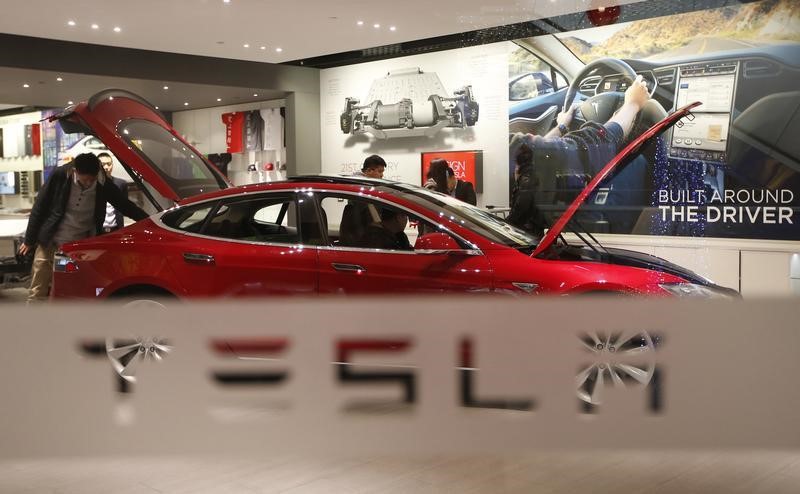© Reuters.
Investing.com — Here is your weekly Pro Recap of the past week’s biggest headlines in the electric vehicle space: Tesla’s continued legal troubles; US commits to EV advancement; and China EVs shine in August.
As always, InvestingPro users get EV headlines at lightning speed. Never miss another opportunity to secure an edge for your portfolio.
Tesla faces NHTSA scrutiny and legal challenges
The National Highway Traffic Safety Administration (NHTSA) in July sent Tesla (NASDAQ:) a notice seeking additional information on modifications made to the EV giant’s driver monitoring system, which is an integral part of the company’s autopilot software, as revealed by documents released on Tuesday.
NHTSA is specifically concerned about a software update that extends how long drivers can utilize it without requiring them to apply force to the steering wheel. US regulators are worried that this relaxation of controls could lead to drivers becoming inattentive and increase the risk of inadequate supervision of the autopilot system.
Adding to Tesla’s challenges, the company is set to face legal proceedings this month and in October regarding allegations that its Full Self-Driving (FSD) autopilot feature has been responsible for fatal accidents.
The initial trial, in California’s state court, involves a civil litigation case alleging that Tesla’s Autopilot system caused a Model 3 owned by Micah Lee to suddenly veer off a highway east of Los Angeles while traveling at 65 miles per hour. The alleged malfunction resulted in a collision with a palm tree, causing the vehicle to catch fire, and the incident transpired in a matter of seconds.
The second trial is scheduled for early October in a Florida state court and revolves around a 2019 accident north of Miami in which Stephen Banner’s Model 3 collided with the trailer of an 18-wheeler big-rig truck that had entered the road. The collision resulted in the vehicle’s roof being torn off, leading to Banner’s death. The lawsuit contends that Tesla’s autopilot failed to apply the brakes, steer, or take any measures to avoid the collision.
Tesla has denied responsibility for both accidents, attributing them to driver error and asserting that their Autopilot system is safe when monitored by human drivers.
As all this plays out, Tesla continues to wage its price war, announcing Friday that there will be further price cuts in China for its Model S and Model X EVs.
Also on Friday, the company revealed its redesigned Model 3 with extended range capabilities. The new Model 3 is Tesla’s first big change to its affordable-car lineup since the successful global introduction of the Model Y in 2020.
Tesla hasn’t yet provided a launch date for the new Model 3 in the US market. Right now, they’re offering more than $5,000 in discounts on some of the cars they already have in stock in the US.
US allocates $12 billion for EV advancement
During a briefing with journalists on Thursday, US Energy Secretary Jennifer Granholm announced that the US will allocate $12 billion in funds, accessible through grants and loans, to support automakers and their suppliers in retrofitting their facilities for the production of electric and other advanced vehicles.
This announcement comes at a time of tense negotiations between the United Auto Workers union and the three major auto companies concerning wages and benefits for workers involved in the production of EV batteries. However, Granholm clarified that it remains uncertain whether this funding will have any impact on these ongoing negotiations.
In addition to EVs, the funding may potentially encompass factories involved in the manufacturing of efficient hybrid vehicles, plug-in electric hybrids, plug-in electric drive vehicles, and even hydrogen fuel cell vehicles, as outlined by the Energy Department.
China’s EV makers shine in August
Rival EV makers in China reported impressive delivery numbers for August, demonstrating the EV market’s continued growth there.
Li Auto (NASDAQ:) achieved an all-time high in sales, with 34,914 vehicles delivered in August, marking a 2.3% increase from the previous record of 34,134 vehicles, set in the month prior. This remarkable figure represents a staggering 664% surge when compared with the same month last year.
Nio (NYSE:) reported deliveries of 19,329 vehicles for August, though this represented a slight decrease of 5.5% compared with the previous month’s record of 20,462. Nonetheless, it reflected an impressive 81% increase when compared with August of the previous year. Nio’s delivery guidance for the third quarter, ranging from 55,000 to 57,000 electric vehicles, suggests that the company is currently exceeding the upper end of its delivery projections.
XPeng (NYSE:) achieved a significant milestone in August by delivering 13,690 vehicles, the highest number since June 2022. This marked a notable 43% increase compared with the same period a year earlier. Additionally, sales experienced strong growth of 24.4% compared with the 11,008 EVs delivered in July, marking the seventh consecutive month of sequential gains.
According to the China Passenger Car Association, as of August 27, retail sales of passenger new energy vehicles (NEVs) in China reached 538,000 units, indicating a 2% increase compared with the previous month, underscoring the ongoing expansion and competitiveness of the electric vehicle market in China.
***
Get ready to supercharge your investment strategy with our exclusive discounts.
Don’t miss out on this limited-time opportunity to access cutting-edge tools, real-time market analysis, and expert insights. Join InvestingPro today and unlock your investing potential. Hurry, the Summer Sale won’t last forever!

Read the full article here













